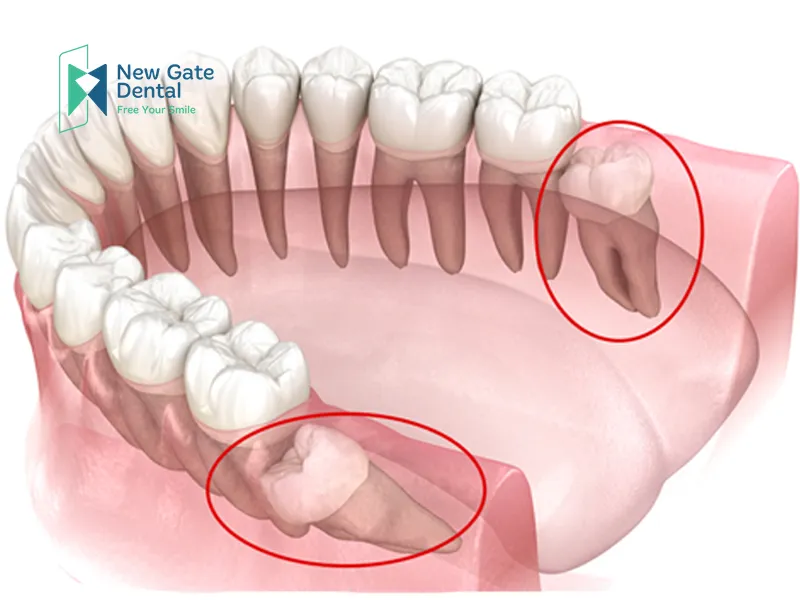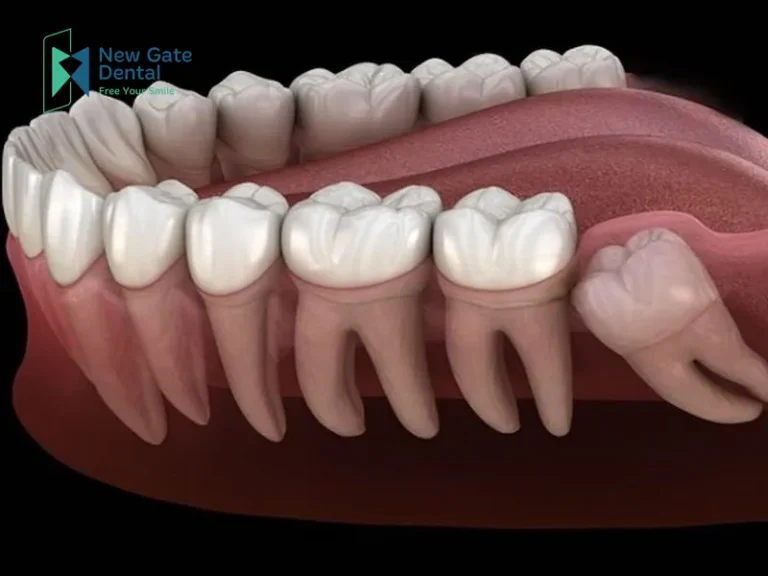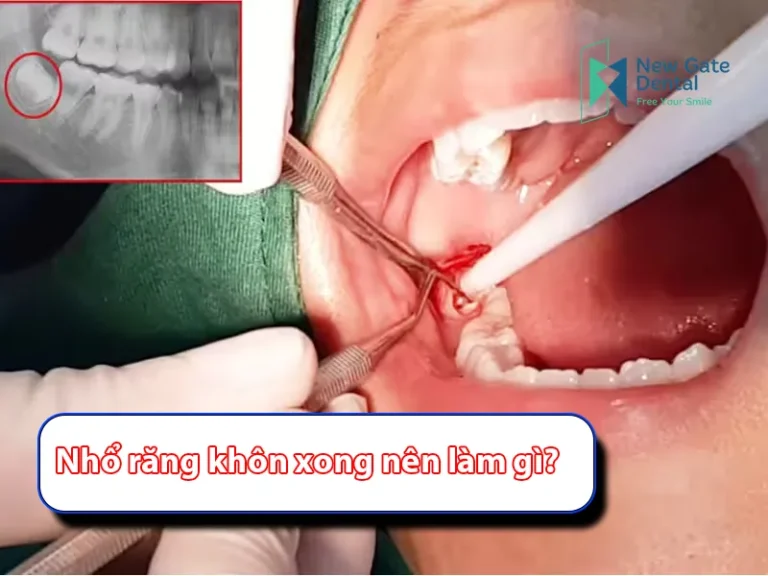Wisdom teeth not erupting can lead to various serious complications. This article from New Gate Dental will help you explore the causes, symptoms, complications, and treatments for wisdom teeth that fail to emerge. Let’s take a closer look!

Causes of Wisdom Teeth Not Erupting
Several factors can lead to wisdom teeth not erupting, ranging from genetic influences to jaw structure. Below is a summary of the main causes:
| Cause | Description |
|---|---|
| Lack of Space | The jaw is fully developed, leaving insufficient room for the wisdom teeth to grow. |
| Abnormal Positioning | Wisdom teeth may grow at an angle, sideways, horizontally, or even inverted. |
| Impaction | Wisdom teeth may become trapped beneath the gums, jawbone, or soft tissue. |
| Genetic Factors | Genetic predisposition can affect the incidence of wisdom teeth not erupting. |
Symptoms of Wisdom Teeth Not Erupting
When wisdom teeth do not erupt or grow abnormally, the body sends out warning signals. Common symptoms include:
- Pain in the Lower Jaw: The pain can range from dull to severe, radiating to the ear, neck, or head.
- Swollen Gums: The gums near the wisdom teeth may swell, become red, and feel sensitive.
- Difficulty Chewing: Misaligned wisdom teeth can hinder chewing, causing pain and discomfort.
- Bad Breath: Impacted wisdom teeth can create an environment for bacteria to thrive, leading to bad breath.
- Gum Inflammation: Signs indicating that the impacted wisdom teeth are causing harm.
Complications of Wisdom Teeth Not Erupting
If left untreated, wisdom teeth not erupting can lead to several serious complications:
- Pulpitis: Infection affecting the dental pulp, resulting in severe pain.
- Dental Abscess: Infection spreads, creating a pus-filled pocket around the tooth root.
- Jawbone Resorption: Misaligned wisdom teeth can exert pressure on the jawbone, leading to bone loss.
- Impact on Adjacent Teeth: Impacted wisdom teeth can damage neighboring teeth.
Diagnosis of Wisdom Teeth Not Erupting
To accurately diagnose the condition of wisdom teeth not erupting, the dentist will perform two main steps:
- Clinical Examination:
- General assessment of oral health.
- Evaluation of the position and shape of the wisdom teeth.
- Identification of symptoms and abnormal signs.
- X-ray Imaging:
- Provides clear images of the position, shape, and relationship of the wisdom teeth.
- Types of X-rays include panoramic and cone beam CT scans.
Treatment for Wisdom Teeth Not Erupting
The most common treatment for wisdom teeth that do not erupt is extraction. The tooth extraction process involves:
- Local anesthesia.
- Detachment of the gum and bone around the tooth.
- Extraction of the wisdom tooth.
- Suturing the surgical site.
- Post-operative care instructions.
In more complex cases, the dentist may recommend surgical intervention, which may include:
- Apicoectomy: Surgery to remove the tip of a tooth’s root.
- Gingivoplasty: Reshaping the gums.
- Osteotomy: Surgery to cut and reshape the bone.

Recommendations
To prevent and promptly address issues related to wisdom teeth not erupting, you should:
- Visit your dentist every six months for regular check-ups.
- Avoid self-treatment of wisdom teeth at home.
- Choose a dentist with expertise, experience, and modern equipment.
- Maintain good oral hygiene.
- Pay attention to any unusual signs in your mouth.
Wisdom teeth not erupting is a common issue but should not be taken lightly. Understanding the causes, symptoms, and complications will help you take proactive steps in caring for your oral health. Listen to your body and seek professional dental advice when necessary.
Related Questions About Wisdom Teeth Not Erupting
- Is having wisdom teeth not erupting dangerous?Yes, wisdom teeth not erupting can be very dangerous if left untreated. They can lead to complications such as gum disease, pulpitis, dental abscesses, and even jawbone loss. Additionally, impacted wisdom teeth can affect neighboring teeth, causing cavities or misalignment.
- How can I tell if my wisdom teeth are impacted?Wisdom teeth not erupting often do not exhibit clear symptoms. However, if you experience pain in the lower jaw, swollen gums, difficulty chewing, bad breath, or gum inflammation, you should consult a dentist for an evaluation. The dentist will conduct a clinical examination and take X-rays to accurately assess your wisdom teeth.
- Can wisdom teeth be extracted if they haven’t erupted?Whether to extract unerupted wisdom teeth depends on the specific situation. If the wisdom teeth are developing normally and not causing any issues, they may be retained. However, if wisdom teeth are impacted and causing symptoms or complications, extraction is often the best solution to protect oral health.

Frequently Asked Questions
New Gate Dental hopes this article has helped you understand the causes, complications, and symptoms of wisdom teeth not erupting. If you are experiencing such issues or have questions about dental knowledge, please contact us for expert advice!
Contact Information:
- Branch: 04 Dang Tat Str., Tan Dinh Wd., District 1, HCMC
- Branch: 218 Tan Huong Str., Tan Quy Wd., Tan Phu Dist., HCMC
- Hotline: 085 522 9911
- Website: NewGateDental.com
- Fanpage: New Gate Dental
- NewGate Dental Treatment pricing chart - 06/10/2024
- What Are Orthodontic Rubber Bands? Types of Rubber Bands Used in Braces - 04/10/2024
- When Should You Extract Wisdom Teeth? - 04/10/2024










